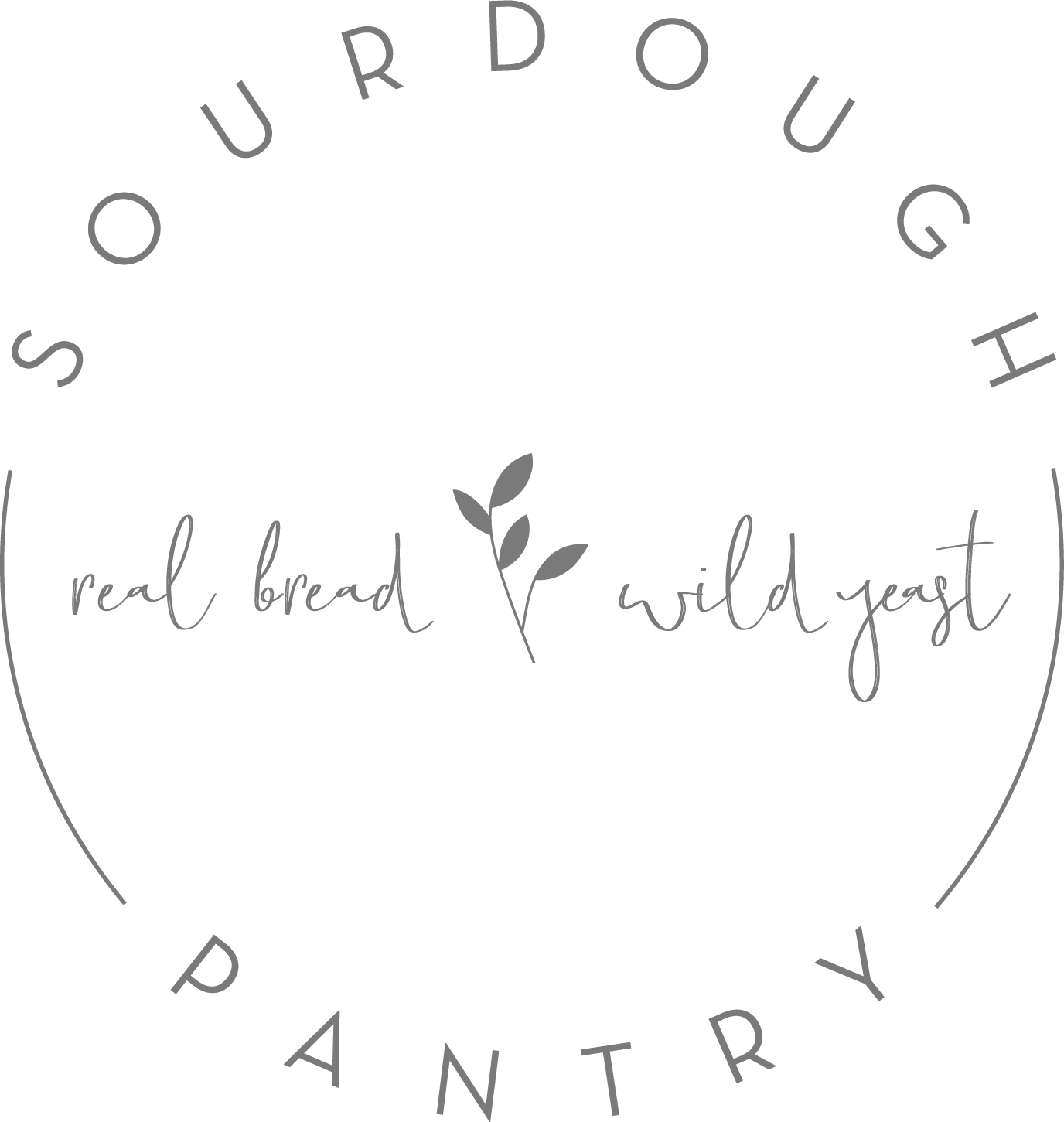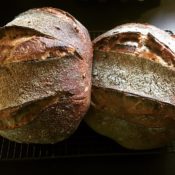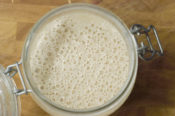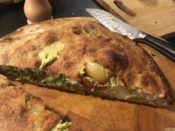

My name is Lydia. I grew up in Ireland, where good bread is part of a common heritage; everyone either makes their own soda bread or buys it daily from one of their (many) local bakeries. I moved to England as a teenager and lived in London as I was establishing a career as a journalist and architectural historian. In the capital it’s pretty easy to find decent bread and good (if expensive) sourdough. Six years ago I moved to Oxfordshire, to a village without a bakery. To save a drive to town, I started making my own bread.
I started off using off-the-shelf yeast to make bread – it’s easier because the timings are predictable and the finished goods are delicious, fresh and better than almost anything you can buy in a bakery. I’m not snooty about putting in some good-quality commercial yeast when I’m short of time, so here are my favourite recipes for yeasted goodies.
But it’s sourdough that keeps me interested… I’ve done a couple of courses but mostly I’ve learnt through trial and error – so many errors! The main thing I’ve learnt is that mistakes are part of the learning process – they make you into a good baker, almost by process of elimination. I keep doing it because I LOVE home made bread. That crunchy, caramelised crust and chewy, soft crumb…
Sourdough Pantry is the sum of my bread-making life: recipes and methods; some science behind what makes sourdough good for you; news from my pop-up village bakery; photos to inspire and – in future – courses for people who want to learn to make great sourdough but don’t want to spend years making the same mistakes I did!
The ‘pantry’ part is tribute to the general baking that goes on in a busy kitchen with inquisitive and hungry kids (and husband) – jams, chutneys, biscuits, cakes, iced buns, eclairs… You get the drift. Here are my favourites.
There is an almost cultish mystic around sourdough bread in some foodie circles – like it’s a high-maintenance creature and unattainable for the home cook. It’s not! Sourdough is simply naturally leavened bread – or bread made without the use of commercial yeast. It makes a tasty, nutritious loaf which can taste slightly sour or not sour at all, depending on how long you leave either the dough or your starter to prove. The natural yeast is a bit trickier to get used to when you start out – commercial yeast is more predictable – but once you’ve become familiar with the texture of a well-proved dough, you’re well on your way to becoming a sourdough baker.
There’s a lot of research about the importance of the microbes in our gut – our microbiome. While the function of a healthy microbiome is not fully understood, there is evidence that the bacteria in our gut plays an important part in supporting our immune system. Sourdough is a fermented food, and is therefore easier for our gut to digest. Some research indicates that fermentation process (the production of lactic acid bacteria) makes some of good things (e.g. wholegrains) in the bread more ‘bio-available’ – that is, easier for our bodies to absorb and to gain the benefit from. I am not a nutritionist, so do not claim further knowledge. Vanessa Kimbell at the Sourdough School is particularly knowledgeable on this subject – please see sourdough.co.uk for further information.
 Basic Sourdough Pantry loaf - (makes two loaves) FOR THE LEAVEN 90g bread flour 90g water FOR THE BREAD 200g leaven 1kg white-bread flour (or any other mix of flour you like) 20g fine sea salt 700-750g water Make the leaven: The morning before baking, put 1 tablespoon of your mature, bubbling starter in a bowl and add 90g of […]
Basic Sourdough Pantry loaf - (makes two loaves) FOR THE LEAVEN 90g bread flour 90g water FOR THE BREAD 200g leaven 1kg white-bread flour (or any other mix of flour you like) 20g fine sea salt 700-750g water Make the leaven: The morning before baking, put 1 tablespoon of your mature, bubbling starter in a bowl and add 90g of […] Sourdough starter recipe - Take a clean jar capable of holding around 400g/ml (I use a tall container which came with a hand-held blender). Put 50g of flour (50/50 mix of wholemeal and white) in the container, then add 50g water and mix well. Leave it on your kitchen counter with the top loosely covered. Don’t seal it tightly. […]
Sourdough starter recipe - Take a clean jar capable of holding around 400g/ml (I use a tall container which came with a hand-held blender). Put 50g of flour (50/50 mix of wholemeal and white) in the container, then add 50g water and mix well. Leave it on your kitchen counter with the top loosely covered. Don’t seal it tightly. […] Impanata - Impanata is an Italian pie which can make a great quick supper if you’re already proving some sourdough. Don’t be limited by what’s below – use up whatever is in your fridge (e.g. leeks and blue cheese instead of broccoli and mozzarella/roasted butternut squash, feta and cumin). It’s great cold for lunch the next day […]
Impanata - Impanata is an Italian pie which can make a great quick supper if you’re already proving some sourdough. Don’t be limited by what’s below – use up whatever is in your fridge (e.g. leeks and blue cheese instead of broccoli and mozzarella/roasted butternut squash, feta and cumin). It’s great cold for lunch the next day […]My pop-up bakery started in my village in south Oxfordshire at the end of 2017. I bake every Friday morning, but using a domestic oven which can only produce six loaves for my lovely customers… Please get in touch for more information.
If you’re interested in coming to a course, please get in touch.

Please get in touch to find out more about our courses, pop-up bakery and anything sourdough related!